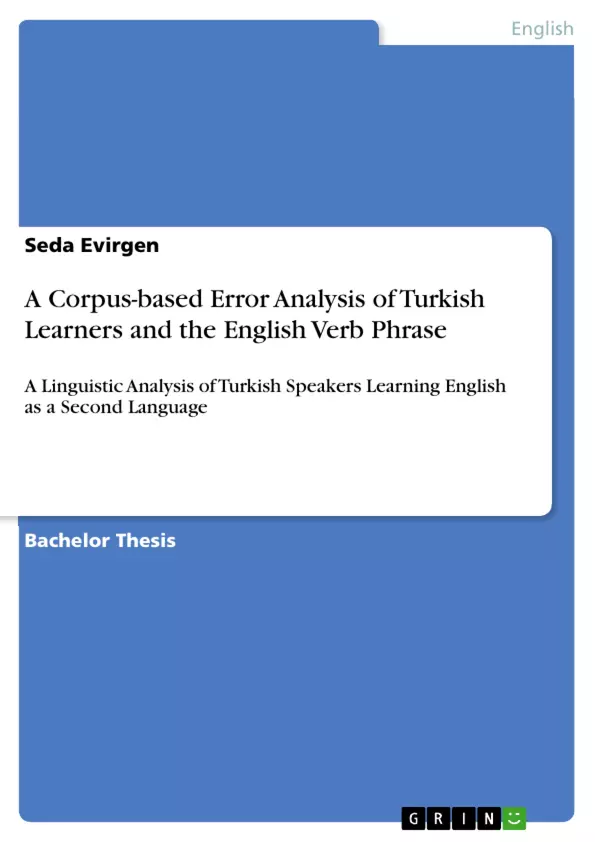In the thesis at hand, a special emphasis will be on Turkish English as a Foreign Language (EFL) learners’ errors and their difficulties when learning English as a second language. Further, it will provide interpretative approaches regarding the reasons for this. The errors that will be analyzed are subject-verb-agreement errors in different subcategories in Turkish EFL students’ writings in the form of argumentative essays.
Furthermore, the essays are analyzed for incorrect verb phrases because of missing verbs, which could be due to the different sentence structures in English and Turkish. The aim is to conduct a corpus-based error analysis in order to investigate and answer two main questions. The first question is, if Turkish EFL students are having difficulties in applying the rules in their essays. The second question deals with the analysis of the error sources to be able to interpret them in order to provide pedagogical implications towards them.
Inhaltsverzeichnis (Table of Contents)
- 1. Introduction
- 2. Theoretical Framework
- 2.1 Definition of Errors
- 2.2 Types and Sources of Errors
- 2.3 Error Analysis and its importance
- 2.4 Comparison of English and Turkish inflectional systems.
- 2.5 Hypothesis
- 3. Methodology
- 3.1 Data
- 3.2 Method
- 4. Results and Discussion
- 4.1 Classification and Interpretation of Errors in Verb Phrases
- 4.2 Discussion
- 5. Conclusion
Zielsetzung und Themenschwerpunkte (Objectives and Key Themes)
This thesis examines the errors made by Turkish learners of English as a Foreign Language (EFL) in their written argumentative essays, specifically focusing on subject-verb agreement errors. The study aims to identify the frequency of these errors and determine if they can be attributed to interference from Turkish, the learners' first language. The research also explores the reasons behind these errors and seeks to provide pedagogical implications for improving EFL instruction.
- Error analysis in second language acquisition
- Subject-verb agreement errors in English
- Cross-linguistic influence and interference
- Corpus-based analysis of learner language
- Pedagogical implications for EFL teaching
Zusammenfassung der Kapitel (Chapter Summaries)
- Chapter 1: Introduction: This chapter introduces the topic of error analysis in second language acquisition and its significance in understanding the learning process. It discusses the importance of errors in language learning, emphasizing the role of correction in promoting accurate language use. The chapter also introduces the focus of the thesis on Turkish EFL learners' errors in subject-verb agreement.
- Chapter 2: Theoretical Framework: This chapter provides a comprehensive theoretical framework for the study. It defines the terms 'error' and 'mistake', explores different types and sources of errors in second language acquisition, and discusses the importance of error analysis. The chapter also examines the differences between English and Turkish inflectional systems, which are relevant to the study's focus on subject-verb agreement errors.
- Chapter 3: Methodology: This chapter outlines the methodology employed in the study. It describes the data source, the Turkish International Corpus of Learner English (TICLE), and explains the methods used for analyzing the data. The chapter provides details about the selection criteria for the corpus and the specific approach used for analyzing the errors.
- Chapter 4: Results and Discussion: This chapter presents the findings of the error analysis. It categorizes and interprets the various types of subject-verb agreement errors observed in the Turkish EFL learners' writings. The chapter discusses the frequency of each error type and explores possible explanations for their occurrence. It also examines the potential influence of Turkish on the learners' errors.
Schlüsselwörter (Keywords)
This thesis explores the topic of error analysis in second language acquisition, focusing on subject-verb agreement errors made by Turkish learners of English as a Foreign Language (EFL). It utilizes corpus-based methods to analyze the errors, examining the influence of the learners' first language (Turkish) on their English proficiency. The study aims to provide pedagogical implications for improving EFL teaching and fostering greater understanding of the challenges faced by Turkish learners.
Frequently Asked Questions: Error Analysis of Turkish EFL Learners
What is the focus of this corpus-based error analysis?
The study focuses on subject-verb agreement errors in the argumentative essays of Turkish students learning English as a Foreign Language (EFL).
Why do Turkish learners struggle with subject-verb agreement?
Difficulties often stem from cross-linguistic interference, as Turkish and English have very different inflectional systems and sentence structures.
What is the difference between an 'error' and a 'mistake'?
An error reflects a lack of underlying linguistic knowledge, while a mistake is a performance slip (like a typo) in using known rules.
What data source was used for this research?
The research utilized the Turkish International Corpus of Learner English (TICLE) to analyze authentic student writing.
What are the pedagogical implications of this study?
The findings help teachers understand specific error sources, allowing them to develop targeted exercises to improve accuracy in verb phrases.
- Quote paper
- Seda Evirgen (Author), 2018, A Corpus-based Error Analysis of Turkish Learners and the English Verb Phrase, Munich, GRIN Verlag, https://www.grin.com/document/451648



